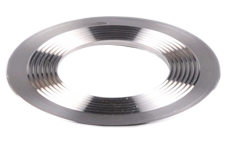
Heat exchanger gaskets come in several forms based on the type of heat exchanger or application. For simplicity’s sake, we use the terms metal jacketed, camprofile and plate to define the different types of heat exchanger gaskets, though there are numerous configurations for each type.
We precision engineer a wide range of gaskets for shell, tube, plate and frame heat exchangers gaskets, which are commonly used in operations involving steam generation and heating/cooling processes.

Heat exchanger gaskets and small spinner gaskets can be fabricated in simple rings or more complicated crossbar designs and configurations.

Composed of a grooved metal core and a graphite or composite sealing layer, camprofile gaskets are supplied in standard and nonstandard dimensions.

Rubber gaskets are essential components in plate heat exchangers. We precision manufacture gaskets to size and thickness to suit the PHE.
Metal jacketed heat exchanger gaskets can be supplied in circular or non-circular form, in standard or non-standard sizes. The gaskets are manufactured in different styles to API, ANSI, DIN and BS standards for all types of applications. The selection of gasket style and metal depends upon the operating conditions and the mechanical features of the flanged assembly.
We can also design custom metal jacketed gaskets based on customer specifications and our specialist knowledge ensures gaskets are fabricated to fit accurately and have an effective seal. Contact us to discuss custom requirements.


Tube and shell exchanger gaskets are fabricated using a soft resilient material that is shrouded with metal to provide additional mechanical strength. Metal clad gaskets are frequently used with narrow flanges. This combination produces a strong resilient gasket which can be fabricated into complex shapes.
The overlapped seams produce a locally high seating stress which contributes to the effectiveness of the seal in critical areas. The crucial sealing area is the peripheral ring which prevents media leakage to atmosphere. Slight leakage across the pass-bars is tolerable since the exchanger manufacture builds-in a designed efficiency-loss catering for leakage at this point.
We recommend that double jacketed gaskets to be designed and dimensioned to allow at least 10mm Radius at all intersections.
| Jacket Materials | Max Temperature | Max PSI/BAR | PN Range |
| 304 Stainless Steel | min-250 max 550 °C | 650°C | 10-320 |
| 316L Stainless Steel | min - 100 max 550 °C | 800°C | 10-320 |
| Duplex | max 300 °C | 800°C | 10-320 |
| Super Duplex | max 300 °C | 600°C | 10-320 |
| 347 Stainless Steel | min -250 max 550 °C | 870°C | 10-320 |
| 321 Stainless Steel | min -250 max 550 °C | 870°C | 10-320 |
| Monel 400 | min -125 max 600 °C | 800°C | 10-320 |
| Nickel 200 | min - 250 max 600 °C | 600°C | 10-320 |
| Titanium | min - 250 max 350 °C | 450°C | 10-320 |
| Hastelloy B-2 | min - 200 max 450 °C | 500°C | 10-320 |
| Hastelloy C-276 | min -200 max 450 °C | 450°C | 10-320 |
| Inconel 600 | min - 100 max 950 °C | 1000°C | 10-320 |
| Inconel 625 | max 800 °C | 450°C | 10-320 |
| Inconel X-750 | max 900 °C | 1000°C | 10-320 |
| Incoloy 825 | min -100 max 450 °C | 450°C | 10-320 |
| Soft Iron, Low Carbon Steel | min -60 max 500 °C | 1000 | 2.5/320 |
| Copper | min -250 max 400 °C | 600 | 2.5/320 |
| Filler Materials |
| Non-asbestos Millboard |
| Non-asbestos |
| Rubber |
| Graphite |
| PTFE |
Our highly experienced technicians can advise you on the best sheet materials and manufacturing processes for a wide range of gasket applications.
We supply a vast range of gasket materials, available to buy directly or order from us. For more information visit the Gasket Sheet Materials page